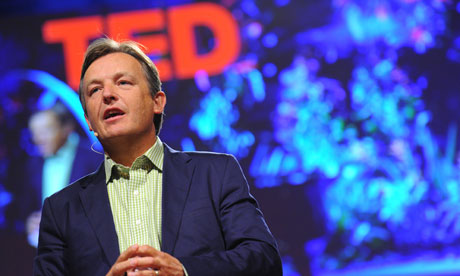TED Tips: How to give a great talk
In a new book, the publishing entrepreneur who has organized the TED Talks phenomenon since 2001 spells out secrets of great public speaking.
If anyone knows what makes a great TED Talk, it is Chris Anderson, the British journalist and publisher turned TED Curator who has greatly expanded the reach of the enterprise since he took over in 2001.
Anderson has grown TED from an annual invitation-only conference focused on technology, entertainment and design (thus TED) to a global nonprofit organization that has posted thousands of talks with free access on the internet in keeping with the organization’s goal of capturing “ideas worth spreading.”
Anderson also enlarged TED’s portfolio of topics to include science, business and key world issues and created the TED Prize, which grants recipients “one wish to change the world.”
TED is a global force
The venture is an intellectual phenomenon. It operates in 3,000 cities. Its 2,000-plus taped TED talks generate one billion views a year.
Now, Anderson is about to publish a book, TED Talks: The Official TED Guide to Public Speaking, that captures what he sees as the key elements of a TED Talk, or any speech designed to inform, engage and inspire. And for those who don’t have time for the book, he’s created a free video, The Secret to Giving a Good TED Talk.
Anderson, 59, was born in a remote village in Pakistan where his parents were working as medical missionaries. He grew up in India, Pakistan and Afghanistan, attending an American school in the Himalayas. After boarding school in England, he graduated from Oxford University in 1978 with a degree in politics, economics and philosophy.
After receiving journalism training, he worked in newspapers and radio, including spending two years producing a world news service in the Seychelles off East Africa.
Early publisher of computer magazines
Returning to the United Kingdom, he became an editor at a computer magazine. Later, he launched his own, called Future Publishing, which initially focused on computers but expanded to cover video games, technology and design.
In 1994, Anderson moved to the United Sates, where he launched Imagine Media, which published Business 2.0 magazine. He later merged Imagine Media and Future Publishing and, at its peak, the company published 150 magazines and websites with 2,000 employees.
He left publishing to work full-time on TED, but the takeover wasn’t easy, as he recounts in another TED Talk, as the loyal following of founder Richard Saul Wurman wasn’t sure Anderson would maintain the values Wurman had imbued in TED.
Gaining confidence of TED loyalists
“I discovered to my horror that the majority of the TED community thought that … TED was done,” he recalled. TED usually sold out a year in advance, but that year, only 70 people signed up.
Anderson took the stage knowing his talk could make or break the organization.
He took a deep breath and told the audience – “You’re looking at a complete loser.” He described how the dot-com bust nearly destroyed his publishing business in 2000.
“The only thing that kept me from going crazy was re-immersion in the world of ideas” and inspiration he found at TED, Anderson told them.
Within an hour, 200 people signed up for the following year’s event.
TED-x encourages local events
Anderson has expanded TED well beyond the annual conference. In addition to TED Talks videos available online, the TED-x initiative, launched in 2009, helps local organizers stage their own TED-style events. More than 8,000 local events have been held and they have produced about 6,000 TEDx talks.
In 2012, TED launched TED-Ed, which offers free educational videos and tools for students and teachers. Today, TED-Ed has a global network of more than 200,000 educators.
Popular TED Talks available on video include: “A 12-year-old app developer” by Thomas Suarez, “The orchestra in my mouth” by Tom Thum, and “The power of vulnerability,” by Brene Brown.
Anderson offers speaking tips
Now the TED curator is also sharing his key tips for an effective talk in a book that will be published in May. Anderson’s advice includes:
- Focus the topic on one big idea and connect each point back to that idea.
- Use anecdotes and humor to build a human connection.
- Use concepts that are familiar to your audience.
- Don’t make sales pitches or boasts.
- If you’re nervous, use your fear to motivate you to prepare.
- Be authentic and make sure you have something worth sharing.
These tips have worked for Anderson and for thousands of TED speakers as their talks have informed and inspired billions of people. Will they work for you?
















There are no comments
Add yours